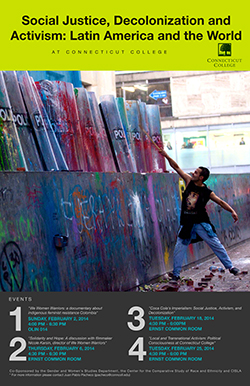Student’s love for homeland drives monthlong series of events

Since coming to Connecticut College four years ago, Juan Pablo Pacheco has wanted to share some of the stories that show the impact United States’ policies and actions have had on his native Colombia. Now, in his senior year, he’s accomplished that goal, producing a four-part series of events that focuses on efforts to reduce social, political and economic inequalities in Latin America.
“Social Justice, Decolonization and Activism: Latin America and the World” comprises film screenings, talks and a forum that Pacheco hopes will further the College’s efforts to promote local and global awareness and engagement, an interdisciplinary approach to knowledge and a commitment to diversity and social justice.
“Latin America has always been a controversial place in its relation to the United States,” explained Pacheco. “It's important that U.S. citizens know the history of their country’s imperialist and neocolonial policies and actions in Latin America, and the ways in which they shape the contemporary reality of Latin Americans as well as U.S. citizens' daily lives and choices.”
Pacheco is majoring in both film studies and a self-designed course of study in cultural studies and criticism, and will also earn a minor in French. He is also pursuing a certificate from the College’s Toor Cummings Center for International Studies and the Liberal Arts (CISLA). In pulling together “Social Justice, Decolonization and Activism,” he was assisted by a faculty and staff of the College, including Associate Professor of History Leo Garofalo, Associate Professor of Ethnobotany Manuel Lizarralde, Visiting Assistant Professor Ariella Rotramel and Mary Devins, the associate director of CISLA.
“I hope people arrive at a better understanding and awareness of the complex interactions between Latin America and the United States, with a critical eye yet ready to engage in different types of promoting social justice,” said Pacheco.
The next event in the series is:
“Local and Transnational Activism: Political Consciousness at Connecticut College”
Tuesday, Feb. 25
4:30 p.m.
Ernst Common Room, Blaustein Humanities Center
In the final event of the series, two short films will be screened: “9.70,” a documentary about group of farmers who suffer under resolution that made it illegal for them to store seeds in order to give private companies and transnational corporations control over the market, and “Grown to Be Sold,” a short film produced on campus about a student-led initiative to stop the purchase of Chiquita and Dole bananas at Connecticut College because of the injustices committed by these companies in Latin America. This will be followed by an interactive forum about anti-capitalist struggles, feminist strategies and critiques, and environmental and social justice.
Previous events included:
“We Women Warriors”
Sunday, Feb. 2
4 p.m.
Room 014, Olin Science Center
A screening of “We Women Warriors,” a documentary about three brave women from different indigenous tribes, using nonviolent resistance to fight for social justice and survival in the midst of Colombia’s armed conflict among the government, paramilitary groups, and the guerrilla groups.
“Solidarity and Hope”
Thursday, Feb. 6
4:30 p.m.
Ernst Common Room, Blaustein Humanities Center
Nicole Karsin, director of “We Women Warriors,” will discuss feminist activism and solidarity, decolonization and anti-capitalist struggles, as well as documentary filmmaking.
“Coca-Cola's Imperialism: Social Justice, Activism, and Decolonization”
Tuesday, Feb. 18
4:30 p.m.
Ernst Common Room, Blaustein Humanities Center
Luis Cardona, the father of a Connecticut College student, is a Colombian union and labor activist working to expose unethical — and possibly criminal — practices by U.S. corporations in Colombia, including Coca-Cola. He will talk about the murder of a union leader he witnessed while employed at a Coca-Cola bottling plant and his quest for social activism and justice in the face of that and other tragic events.
“Social Justice, Decolonization and Activism” is co-sponsored by the Center for the Comparative Study of Race and Ethnicity, CISLA, the Academic Resource Center, the film studies program and the departments of sociology, anthropology, philosophy and gender and women's studies. All of the events are free and open to the public.
January 28, 2014